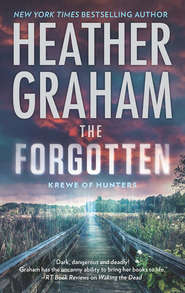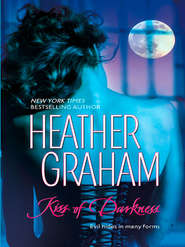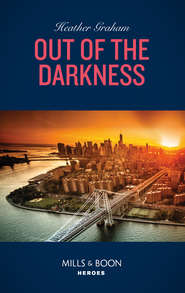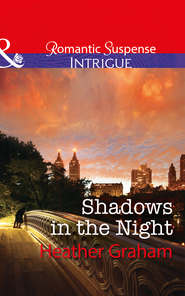По всем вопросам обращайтесь на: info@litportal.ru
(©) 2003-2024.
✖
The Unholy
Настройки чтения
Размер шрифта
Высота строк
Поля
Madison nodded absently. She glanced over at Bogie and wondered sometimes why he didn’t haunt some of the other places he’d loved. And some of the people… He’d told her once, though, “They can’t see me. I can’t reach them. So it just hurts, kid. It just hurts.” And he’d grinned at her. “You reply when I speak to you and I like that. It’s why I keep coming back, kid.”
And now, most of the time, she was glad. Very glad.
“Sam Stone and the Curious Case of the Egyptian Museum,” Bogie said. “I could’ve been in that movie. I think I was busy at the time. Something else going on. Might have been Casablanca. Yeah, probably. That was 1942. Anyway, I always thanked God I wasn’t on that set, because there was a death back then—and it might have been a murder, too.”
Madison tried to see if she could remember her Hollywood lore and legend well enough to recall a murder that had happened during the making of Sam Stone.
“I don’t recall ever seeing anything about it—in any of the lurid books about true Hollywood murders or on any of the history or entertainment channels,” she said.
Bogie joined her on the couch again. Watching him, she hid a smile. He seemed to sit differently from other people she knew. He was relaxed, and still, somehow appeared proper.
“It was 1942. The war effort was in full swing. Movies were being made to encourage heroism—or to try and divert the public from the war. Casablanca,” he said, and grew thoughtful. “Ah, that was a good one for me. There was some great writing on that movie. I wish some of those lines had been my own. That and The African Queen…some of those were my ad-libs. And both of them gave me a persona to live up to.” He paused and looked at her with his famous lopsided grin. “Anyway, I digress, kid. And I’m talking out of line. The death of Pete Krakowski was never officially called a murder. No real inquiries were made, no one was investigated and no one was arrested. There were just rumors on the set, rumors that traveled around. Gotta remember, back then, the studios were king, and they were powerful. Krakowski’s death was seen as a tragic accident, and that’s the way it went. It was long ago and in the middle of a world war, and it wasn’t particularly noted at the time—he was a bit player, not a big star.”
“How did Krakowski die?” Madison asked, puzzled.
“There was some kind of fault with the wiring. He was electrocuted. From what I understood, he was fooling around on set before the filming was to start, and then he was dead. Fried,” Bogie said, shaking his head sadly.
“We’re doing a remake of that movie—and I never even heard about it. Why do you say it might’ve been a murder?” Madison asked.
“You didn’t hear about it because there were accidents on sets from time to time. Krakowski wasn’t the only film person who died that you’ve probably never heard of—no internet back then. You just heard about these things if they happened to a major star or if someone was killed by a lover or a spouse.” He cocked his head toward her. “Bit player, and what was deemed an accident. Nothing sensational about it, and Krakowski was hardly a household name. Like I said, no way for every little piece of news to be known across the country back then. No Twitter, no Facebook and no Google.” He was quiet for a minute. “I woulda liked a Facebook page,” he said.
“Actually, there are several devoted to you,” she said. “But why would someone suspect it was murder? It sounds like an accident.”
“I knew the key grip and the lead electrician on that film. They were the best in the business. If they were working the rigging and electric, both were safe.” Bogie waved a hand. “Anyway, Krakowski’s death is a far cry from a starlet being sliced up in the tunnel. A far cry, indeed.” He leaned back, nostalgic. “I remember that old cinema from way back. Played silent films, even before my time. It’s a shame, a damned shame. That Eddie Archer has a real appreciation for the past—this shouldn’t have happened on his property. Shouldn’t have happened to the poor girl, either.”
Madison realized that she’d been feeling sorry for and worried about Eddie Archer and his son, Alistair. She’d almost forgotten the victim.
Was that how it had been when the death had occurred during the original filming?
“Lord,” she whispered. “You’re right. The poor girl.”
“That’s Hollywood for you,” Bogie said. “It’ll steal your soul, if not your life. There’ve been so many who came here with such dreams and wound up dead. Christa Helm, Dorothy Stratton, Dominique Dunne, Elizabeth Short or the Black Dahlia, Sharon Tate. Peg Entwhistle, the only one to really jump from the Hollywood sign. I remember that,” Bogie said. “She found her fame in death. And we may never find out what really happened to Marilyn Monroe.” He paused. “Did you know the young woman who was killed?”
Madison nodded, then shook her head. “I can’t say I knew her. I met her a few times when she was with Alistair and once at an office party.”
“You work too much, kid. You’ve gotta remember, none of it’s worth anything if you don’t have a life.”
Madison arched a brow and refrained from reminding him that the last time she’d brought a date home, she’d acted like an idiot because Bogie had been watching something on her television and had said, “Don’t mind me, kid.” He loved TV. He couldn’t do a lot on the physical plane, but he could manage such simple tasks as pushing buttons on the remote control. He adored old sitcoms and liked to keep up with the television news.
“There has to be some information on Krakowski’s death,” she said, returning to their previous topic.
“There was—one newspaper article. No follow-up. He died. It was sad. He was buried. And that was that. I’m sure many of us thought about it back then. But time goes by.”
“This is so horrible. For the poor girl, yes, of course. And for everyone who will be touched by it.” She sighed. “Alistair really loves his dad. He didn’t usually bring people to the studio. I mean, I don’t know what went on before—I’ve been there for about three years now. But as far as I can tell, Alistair respects the studio. And he loves film. He wants to get into directing rather than special effects, but…although I didn’t really know Jenny Henderson, I saw the way Alistair followed her around like a puppy dog. He had a huge crush on her. I can’t believe he would’ve killed anyone. And I especially can’t believe he would’ve hurt Jenny. He was crazy about her.”
Bogie shook his head sadly. “Sometimes I think it might have been better back in the bad old days when we were contract players for the major studios. Now, the young and the beautiful come out here willing to do anything for stardom. Anything. Can’t help wondering what Jenny Henderson did—or was willing to do. Or maybe her dreams had nothing to do with her death. Maybe she was simply in the wrong place at the wrong time.”
The wrong place at the wrong time. How could that be possible? The studio was in lockdown. There should have been no one with access to the museum—other than Alistair, Eddie and some of the department heads.
She winced inwardly.
It didn’t look good for Eddie Archer. And it sure didn’t look good for Alistair.
“Sam Stone and the Curious Case of the Egyptian Museum,” Bogie said. “You know, the costuming and effects for that movie were done where you work. The place was Claymore Illusions back then.”
“I know,” Madison told him. “That’s why it seemed so perfect that the studio was hired for the remake. I think the fact that the place was used for creating props, costumes, illusions and whatever was needed for film noir is half the reason Eddie Archer loves it so much.”
“Eddie appears to be a talented man with a real appreciation for the past,” Bogie said, not for the first time.
Madison let out a little cry, startled as something pounced onto the sofa beside her. She laughed at herself.
As if he knew she was upset and needed some warmth, Ichabod meowed and settled his furry body next to hers.
“Hey!” Bogie said softly. “It’s going to be all right. Don’t go getting all jumpy on me now.”
Madison forced a smile despite feeling a sense of dread.
It wasn’t going to be all right.
* * *
Sean Cameron arrived in L.A. in the afternoon, when the sun seemed to spray down light like a fountain, and the bustle of the city was as frantic as ever. This might be Tinseltown, and massive movie deals might be taking place in any coffee shop, but it was also where he’d learned that it was often the B-lister who had to put on pretensions, and where the working moguls could be as down-to-earth as their gardeners.
Such was the case with Eddie Archer.
Sean had spent five formative years working under Archer. The man was a genius when it came to creating creatures and special effects. To this day, Eddie loathed straight CGI or computer-generated imagery. Of course, effects were effects, but in Eddie’s view, to create what looked real, you had to start with something real. Thanks to Archer, Sean had learned a great deal about physical illusion as well as computer-generated magic. He’d worked with Eddie in many capacities, learning to create costumes and attachments, build creatures, as well as work with computers.
Archer certainly enjoyed his income and the fact that he was customarily sought out by the most important and influential names in the business. But above all, he still loved his art, and he loved sharing that excitement and enthusiasm with promising young artists, wide-eyed and in awe of the chance to work for him.
Sean had gotten a frantic call from Archer an hour before he’d gotten the call from Logan Raintree, head of their Krewe of Hunters unit, telling him he’d received an official request that they be brought in. He assumed that Eddie Archer had used his influence with someone above the local police and even the state police, because just when he’d been about to tell Logan Raintree that he had to go to L.A. one way or another, Raintree had asked him to head out on the first flight and look into the situation.
“Remember, if something’s impossible—then it’s impossible,” Logan had said. “I know this man is an old friend of yours, a mentor. And I know you don’t want his son to be guilty of murder. But our job isn’t to hide things, fix things or help with creative defense mechanisms. Our job is to discover the truth.”
“I’m aware of that, Logan,” Sean had been quick to reply. He hadn’t taken offense. Whenever a team member had any personal involvement in a case, it was important to note what priorities had to be maintained. He’d gone on to say, “But I knew Alistair when he was a kid. Nice boy. He’s trying to figure out how to be his father’s son and his own man. And no, murder wouldn’t be how he’d plan to make his name. From what I understand from Eddie so far, the kid loved this girl. She used him, but he was crazy about her. And he’s a basket case now. He was immediately arraigned, and he’s out on bail—Archer money and pull, I imagine—but he’s basically locked up, anyway. He’s wearing an ankle monitor and he’s at a mental hospital that deals with dangerous and suicidal clients. A posh place, I understand. Apparently it’s where the A-listers go when there’s some kind of serious question about rehab, sanity…or possibility of a criminal offense.”
“I’m sure this place is the best money can buy,” Logan had said.
“Yeah. Archer loves his kid,” Sean had told him.
And Eddie Archer did love his one and only son. Married three times, Eddie Archie had just the one child. Alistair was the son of his first marriage, to Annie Smith, with whom he’d grown up in Valencia, California. Annie had been a fledgling actress, but her first love had been her family. She’d died when a vicious flu strain had swept through the world, shocking everyone with the deaths it had caused. Eddie had been absolutely bereft.
And then lonely. And Alistair had been left without the mother who’d adored him. Eddie made up for that the best he could; he was always there for his son.
But although Annie had been as sweet and dedicated to a man as a woman could be, Eddie hadn’t had much luck with women since her death five and a half years ago. When he’d married Benita Lowe two years after Annie’s death, Sean had come to the wedding. He could have said right then that it wouldn’t last. Benita had practically snatched the bill from the caterer’s hand and had a few things to say about the cost of the reception. Turned out she wanted Eddie to save his money—for her. That marriage had ended in a matter of months. A year ago, Eddie had given marriage another try, again with an actress, Helena LaRoux. Sean knew Helena; she’d attended Eddie’s second wedding with her third husband. Sean hadn’t gone to that wedding. He’d sent his best wishes to Eddie, hoping he was wrong in his judgment of Helena. They’d had a few minutes to talk at Eddie’s wedding to Benita, and he’d discovered that Helena apparently thought Benita’s then-husband was superior to her own, as far as contacts and possibilities went.
Sean heard a horn beep and when he saw Eddie’s car across the divider realized he’d been waiting in the wrong place, pretty sad considering the fact that he’d lived in L.A. for five years and visited frequently ever since. He threw his garment bag over his shoulder and hurried over to slide into the passenger seat of Eddie’s sporty little Ford hybrid.
“Hey, old friend,” Eddie greeted him. “I’d give you a big man-hug, but they don’t let you sit here long these days!”











